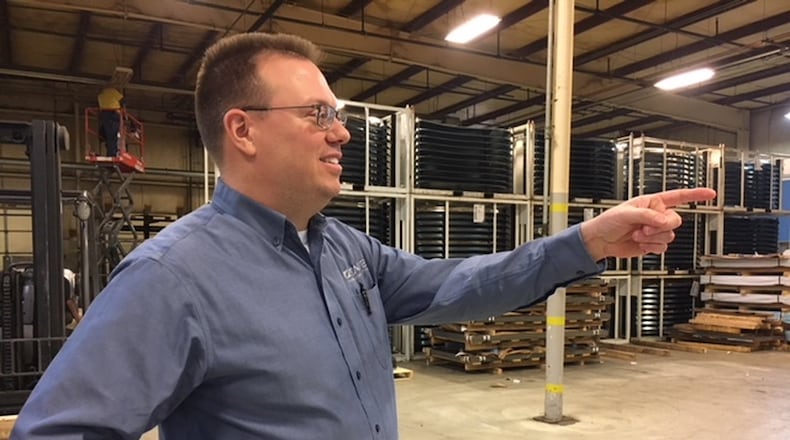“It’s true,” said Steve Staub, co-owner of Staub’s Manufacturing Solutions in Harrison Twp. “We pay more than we used to.”
A recently released study questions whether workers hired through temp-for-hire and staffing agencies is shrinking that premium. According to the study by the liberal-leaning Economic Policy Institute, since 1990 real wages for production workers have risen by only 0.1 percent annually.
THEY MAKE HOW MUCH?
MORE: Marathon CEO makes 935 times as much as his employees
MORE: Teradata CEO makes 137 times as much as his employees
The research points to government data that estimates there are about 1.2 million temporary workers in manufacturing. And nearly one-third of all manufacturing production workers rely on food stamps or other government help “to make ends meet,” the paper says.
But those familiar with manufacturing in Southwest Ohio have a different take. They say the community’s need for qualified workers pushes starting pay up.
Manufacturers in the region are forced to nudge starting pay upward to draw the best applicants, said Staub and Angelia Erbaugh, executive director of the Dayton Region Manufacturers Association.
“Wages are going up because of supply and demand,” Erbaugh said.
Erbaugh said she she has seen starting wages in area manufacturing rise from a range of about $8 to $10 an hour to closer to $11 to $14 an hour today.
Less than a year ago, one of the area’s fastest growing manufacturers, auto glass producer Fuyao Glass America, gave all of its Moraine production associates a $2 hourly raise. This was in the midst of a representation campaign waged by the United Auto Workers, who later lost an election to form a bargaining unit at Fuyao.
The demand for workers “is not lessening at all,” Erbaugh said.
“It’s still their (employers’) No. 1 concern,” she said. “Every meeting, every gathering, that’s always a top concern.”
Doug Barry, owner of Dayton staffing firm Barry Staff, said companies are competing for the right applicants.
“We see companies doing sign-on bonuses for entry-level people right now,” Barry said.
The problem is “a region-wide shortage of workers,” he said.
MORE: Investors want a new CEO at Gibson guitars
“This is causing an underemployment problem,” Barry said. There aren’t enough qualified people for the openings manufacturers have. Employers want to promote workers, but they can’t backfill the positions with younger people, he said.
“We don’t have any (manufacturing) companies that pay minimum wage … I would say our unwritten minimum wage right now is probably $10, if not a little higher.”
Tom Maher, owner of the Dayton Manpower Group office, said area manufacturers are competing with logistics and distribution employers for the same type of worker.
Employers also watch as their workers move on for even a small boost in pay, he said.
“People will jump jobs for a relatively small amount of money, as little as 25 cents an hour,” Maher said.
Maher said a manufacturing pay premium remains, even if it isn’t as strong as it was in the 1970s and 1980s. “There’s certainly a premium over anything like retail and fast food and anything of that nature,” he said.
Lawrence Mishel, author of the EPI paper, said manufacturing continues to pay better than other sectors with comparable workers at the same age and education level — about 13 percent more in wages and benefits compared to non-manufacturing jobs.
MORE: Mikesell's must pay $240,000 in back-pay, feds say
But that manufacturing pay premium was closer to 19 percent in the 1980s, he said.
Some places, especially auto plants in the South, use temp agencies essentially as outside HR firms. Workers there can earn a third less compared to other employees, Mishel said.
“Manufacturing still pays more than others but we have to still be worried about the quality of manufacturing jobs,” Mishel said.
But Erbaugh said Dayton manufacturers don’t use a lot of “temporary” workers. She said they do rely on staffing agencies as a way to “screen” applicants, for help in finding people who will be a good fit at their companies.
About the Author

